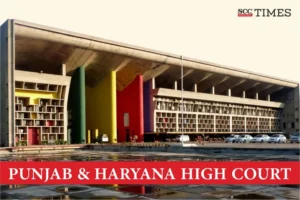Punjab and Haryana High Court: In a habeas corpus petition filed by the petitioner-paternal uncle seeking the release of his minor nephew from the child’s mother, a Single Judge Bench of Harpreet Singh Brar, J., dismissed the petition, holding that a parent could not be implicated for kidnapping their child as both the parents were equal natural guardians.
Background
The petitioner’s brother and respondent 4/ mother, had a minor son aged around 12 years/ the alleged detenu. The child was residing with the father, and the couple was in a custody battle qua him. It was contended that when the father was on a business trip in Belgium, the mother took away the child from his habitual residence.
Aggrieved, the paternal uncle filed the present case seeking the release of his nephew from the illegal custody of the child’s mother.
Analysis and Decision
Upon perusal of Section 361 of the Penal Code, 1860, and Section 6 of the Hindu Minority and Guardianship Act, 1956 (‘HMGA’), the Court stated that for an incident to be considered as kidnapping, the minor child must be taken away from the custody of a ‘lawful guardian.’ However, a mother fell well within the ambit of a ‘lawful guardian’, especially in the absence of an order passed by a competent Court divesting her of the same. The Court held that a parent could not be implicated in kidnapping their own child as both the parents were equal natural guardians.
Further, the Court remarked that it had noticed an increasing tendency amongst disgruntled parents to move a habeas corpus writ petition to settle the custody of their children. In this regard, the Court referred to Tejaswini Gaud v. Shekhar Jagdish Prasad Tewari (2019) 7 SCC 42, wherein the Supreme Court stated that habeas corpus proceedings are not to justify or examine the legality of the custody. They are a medium through which the custody of the child is addressed at the discretion of the Court.
The Court reiterated that the welfare of the minor would reign supreme while deciding upon the matter of his custody. The Court added that Section 6 of HMGA categorically states that the custody of a minor child up to the age of five years shall ordinarily be with the mother. In doing so, the legislature recognised the indispensable and inimitable role of a mother in a child’s upbringing. A mother’s love for her children is selfless, and the lap of the mother is God’s own cradle for them. Therefore, children of tender years ought not to be deprived of said love and affection.
Regarding the facts of the case, the Court noted that the mother ordinarily resides in Australia. The child was left with the house help by his father while he was on a business trip to Belgium. Perturbed by the same, the child called his mother in distress, and she flew from Australia to be with him. The Court stated that even though the matrimonial relationship between the parents had soured, the relationship between a parent and child subsisted, and it was only natural for a mother to give in to her maternal instincts and respond to the calls of her distressed child. It would also be rather unfair to expect her to leave her minor child in a place where he was uncomfortable, more so in the absence of a judicial order prohibiting her from intervening. Additionally, since the guardianship petition was pending, the Court stated that the father could not claim sole custody over him either.
Thus, the Court held that it would be just and prudent for the Court to consider the wishes and well-being of the child, who was 12 years old and capable of forming a rational opinion about his living situation. As such, at this stage, any interference by this Court would be unwarranted.
Accordingly, the petition was dismissed.
[Raja Rekhi v. State of Haryana, 2025 SCC OnLine P&H 2194, decided on 29-04-2025]
Advocates who appeared in this case:
For the petitioner: Senior Advocate Arundhati Katju, Anand V. Khanna, and Harmanbir S. Sandha,
For the respondent: Manjinder Singh Saini and AAG Ramesh Kumar Ambavta

